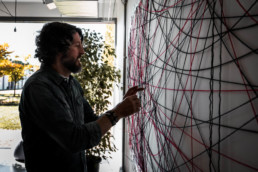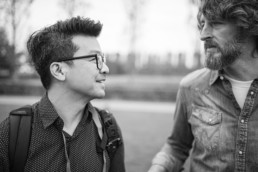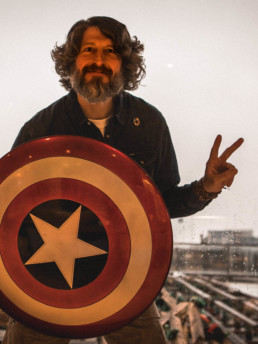The Learning Economy
Marc Buckley:A Systems View Approach
United Nations sustainable advocate and resilient futurist, Marc Buckley, talks with the Learning Economy’s Jeremy Tai Abbett about the need to addressing everything as a complete system in a clean tech, emerging technology fashion.





I’ve had the pleasure to call Marc a friend ever since I met him sharing his passion; the well-being of the planet. Ever since, I never miss the chance to capture a moment as the ones above. The black and white photo is from Marc Stickler.
The Learning Economy - Episode 02
Marc Buckley: A Systems View Approach to Life
[00:00:23] Jeremy Tai Abbett: Hey everyone, I’m Jeremy Abbett designer and passenger on spaceship earth. Today, I sit down with Marc Buckley – a climate activist, and one of the very first speakers to be trained by Al Gore. He’s also an advocate for the SDGs, resilient futurist, member of the expert network for the World Economic Forum for innovation, global food reformist, and sustainable futurist.
[00:00:47] In this episode, we talk about systems thinking, learning, and resilient futures.
[00:00:52] I’m sitting here with Mark Buckley. We met how many years ago?
[00:00:57] Marc Buckley: There’s been a few. I think at least three.
[00:00:59] Jeremy Tai Abbett: Yep. And we’ve been at a few events together around the world, mostly Europe.
[00:01:03] Marc Buckley: Many events.
[00:01:04] Europe. Italy.
[00:01:05] Jeremy Tai Abbett: Mark is the one that introduced me to this idea of being an advocate for the environment. For the audience to understand what you do or what you call yourself or how you want to be seen…what do you do? What is your title?
[00:01:18] Marc Buckley: There’s a German word that I love the best. It’s called a eierlegende Wollmilchsau, and it’s an egg laying wool, milk pig. Basically, it’s somebody who does everything. I really liked the systems view of life and approach to things.
[00:01:32] So, I do many different things. I’m a United Nations sustainable development goal advocate. I’m also a United Nations resilient futurist, because I’m working on what they call the Resilience Frontiers. It’s the roadmap and vision, using foresight-modeling and backcasting and dynamic modeling, to build the roadmap from 2030 to 2050. What happens after the sustainable development goals after 2030.
[00:02:01] And then I’m a global food reformist and activist and I was one of the first 50 people trained by Al Gore as a climate speaker in his ranch in Carthage, Tennessee. So I do a lot, a lot of different things that come from a long history of entrepreneurs and business owners and organic farmers. And, and have of just constantly every day getting up and being busy, doing as much as I can to to make an impact in this world.
It's really about how we produce that will solve those problems in the future. It's that we address everything as a complete system and we do it in a clean tech, emerging technology fashion.
— Marc Buckley, United Nations sustainable advocate and resilient futurist
[00:02:29] Jeremy Tai Abbett: Excellent. So let’s take a step back. And you mentioned that you, you grew up kind of in this world of organic farming. How did you get to where you are now? I read, and we’ve talked about it before, that you’re a part German?
[00:02:42] Marc Buckley: Yeah. My mother was German. My grandmother was from Innsbrook, from Austria. My grandfather was German.
[00:02:49] Jeremy Tai Abbett: You’ve been to Germany before?
[00:02:50] Marc Buckley: Just as a little baby. I started coming to Germany and really, right from the beginning, felt like a global citizen. I mean, my mother brought me here as a little baby and we went to Italy and to Spain and to Austrian and to Germany. This whole world just began to open up as a little baby; just to see my relatives and, and her family. And then it just spread. Over the years as I grew up, my world was already small for me.
[00:03:19] Jeremy Tai Abbett: And where did you grow up in the U.S.?
[00:03:21] Marc Buckley: East Hampton, New York and then also in the Midwest. In Salt Lake city, Utah and California, in Sausalito and in Idaho. Kind of moved around in different areas.
[00:03:33] Jeremy Tai Abbett: Pretty much everywhere.
[00:03:34] Wow. You mentioned your mother, but I also you have a quote from your father, “Treat others as you would like to be treated. Can you talk a little bit about that?
[00:03:42] Marc Buckley: The Golden Rule.
[00:03:43] Jeremy Tai Abbett: Yeah, the Golden Rule.
[00:03:44] Marc Buckley: Exactly. So there’s this, Golden Rule is basically treat people how you would like to be treated. And the new emerging golden rule for the last five, six years has really…treat people on planet, how you would like to be treated. So, it’s not just other people, but we see each other as more his homo symbiosis, symbiotic earth, that we’re not at the top of the chain or pyramid of our planet. But we’re very integrated in the ecosystem of our world. And that is really the golden rule.
[00:04:16] I learned at a young age from my father, and we used to go camping and do a lot of things in nature and outdoors. He’d always say, “You know, leave it better than you found it.” You know, pack your trash out and, and do things. I was really blessed to see those things at a young age.
[00:04:36] There’s one thing that I’d like to interject, if you don’t mind seeing you started out about the education in this podcast. And so for me, that’s really a vital thing. That’s why I’m an advocate and I talk about the SDGs and many other things. But, I see it as this update of collective intelligence. I think that by sharing your story, by sharing your experience, it’s a different form of education and insight that most people don’t always get to get or receive.
[00:05:04] And when. We share that it actually benefits us all because it’s like an update of collective intelligence; the more we have that information and find out how other people’s stories and have advanced and grown and learn and, and their journeys, then we can also update our collective intelligence as humanity progress.
[00:05:28] I’m big on emerging technologies and thing. And what I, I kinda believe is, is lacking, is this real time update of collective intelligence on our world. That we’re not repeating some of the same mistakes that they made 200 years ago or 300 years ago. That were, you know, the definition of insanity is doing the same thing over and over and over again, hoping for different results.
[00:05:53] I really think it’s a lack of this collective intelligence. We have too much fake news and muddled information out there that it’s nice to, to get that information that’s vital for us to grow and not repeat the same mistakes as others. That some things that we don’t get in school anymore. You know?





